| Elie Wiesel | |||
|---|---|---|---|
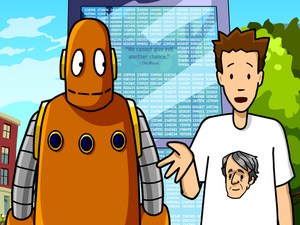 | |||
| Airdate | May 2, 2017 | ||
| Curriculum | Social Studies | ||
Elie Wiesel is an episode of BrainPOP launched on May 2, 2017.
Summary[]
Tim and Moby are at the New England Holocaust Memorial in Boston, looking at numbers on a board. Tim explains that each number represents a Jewish person who died in the Holocaust, the systematic execution of 11 million Jewish people. He then receives a letter from Elijah and Shira Wiesel, asking if Tim can make a video about their grandfather who recently passed away: Elie Wiesel, most famous for writing about the horrors of the Holocaust.
Tim complies, and tells the story of Wiesel.
Appearances[]
Transcript[]
FYI[]
Around The World[]
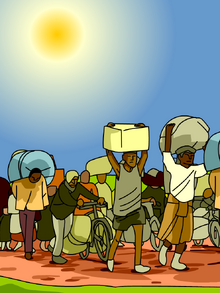
In 1944, at the height of the Holocaust, a Polish-Jewish lawyer named Raphael Lemkin coined a term for the attempt to violently wipe out an entire race, ethnicity, nation, or religion: genocide. The word is derived from genos, Greek for "race," and cide, Latin for "killing."
The Holocaust wasn't the first genocide; nor would it be the last. After Holocaust survivor Elie Wiesel was awarded the Nobel Peace Prize in 1986, he used his platform to challenge world leaders to combat genocide. He believed that powerful nations have a moral responsibility to protect those being systematically oppressed.
In 1992, Wiesel began raising awareness about genocide in Bosnia and Herzegovina, a country in Eastern Europe. With the support of the Yugoslav Army, Bosnian Serbs were forcibly removing and murdering hundreds of thousands of Bosnian Muslims. The Serbs' ethnic cleansing campaign aimed to create an ethnically pure "Greater Serbia."
Wiesel publicly pleaded with President Bill Clinton to stop the bloodshed. He also traveled to the region to meet with leaders and champion peace. Thanks in part to his advocacy, the International Criminal Tribunal for the former Yugoslavia was formed in 1993, and has since indicted more than 150 war criminals.
Wiesel also spoke out against the 1994 genocide in the East African nation of Rwanda. The government, run by members of the majority ethnic group the Hutu, slaughtered approximately 800,000 members of the minority ethnic group, the Tutsi. 20,000 Hutus who opposed the genocide were also killed. Wiesel was a vocal critic of the lack of international response. He called the United Nations' slow reaction to the crisis "a mark of shame on the U.N. and the world."
When war erupted in the Kosovo region of Yugoslavia in 1998, Wiesel once again called upon President Clinton to intercede. Ethnic Serbs were oppressing and murdering the country's ethnic Albanians. A joint United States-NATO bombing campaign eventually ended the war, but not before one million Albanians were driven from their homes. Wiesel visited refugee camps in the region, bringing a television crew to document the aftermath of the ethnic cleansing and to give a voice to its victims.
Wiesel continued his humanitarian efforts in the North African nation of Sudan. In 2003, the Sudanese government and the Janjaweed militia started slaughtering hundreds of thousands of non-Arabs in the country's Darfur region. Speaking at the Darfur Emergency Summit in 2004, Wiesel called for world leaders to denounce the Darfur Genocide, and urged immediate humanitarian aid and U.N. intervention. To the world's everlasting shame, the crimes against humanity in Darfur persist today.
Today, Wiesel's legacy lives on in the Elie Wiesel Foundation for Humanity. The organization works to combat "indifference, intolerance, and injustice through international dialogue and youth-focused programs that promote acceptance, understanding, and equality." In nurturing these qualities in young people, Wiesel hoped that new generations would be less likely to repeat the mistakes of their forbearers.
Quotables[]
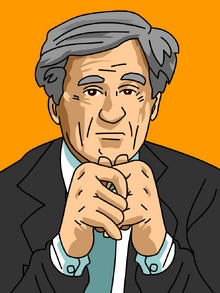
Elie Wiesel knew that the world's silence enabled the horrors of the Holocaust, and he devoted the rest of his life to giving voice to the voiceless. Here are some words from the man the Nobel Committee called a "messenger to mankind:"
"The opposite of love is not hate, it's indifference." —interview with U.S. News and World Report, 1986.
"I swore never to be silent whenever and wherever human beings endure suffering and humiliation. We must always take sides. Neutrality helps the oppressor, never the victim. Silence encourages the tormentor, never the tormented." —Nobel Peace Prize acceptance speech, 1986.
"No human race is superior; no religious faith is inferior. All collective judgments are wrong." —interview with Parade magazine, 1992.
"[The victim's] pain is magnified when he or she feels forgotten. The political prisoner in his cell, the hungry children, the homeless refugees—not to respond to their plight, not to relieve their solitude by offering them a spark of hope is to exile them from human memory. And in denying their humanity, we betray our own." —"The Perils of Indifference," remarks at the White House, 1999.
"Sudan has become today's world capital of human pain, suffering and agony. There, one part of the population has been—and still is—subjected by another part, the dominating part, to humiliation, hunger, and death. For a while, the so-called civilized world knew about it and preferred to look away. Now people know. And so they have no excuse for their passivity bordering on indifference." —Darfur Emergency Summit, 2004.
"Only human beings can move me to despair. But only human beings can remove me from despair." —interview with National Geographic, 2006.
"Why is it we remember? Let's be honest with ourselves: for the dead it is too late. But it is not too late for our children. And we are here this afternoon for all our children and theirs." —Yom Hashoah* rally in Geneva, Switzerland, 2009.
*a day or remembrance for the 6 million Jews who died in the Holocaust.
Arts And Entertainment[]
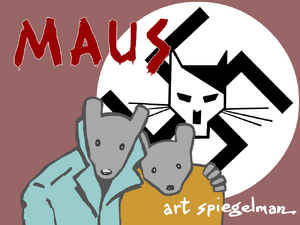
Thousands of books have been written about the Holocaust, but few have had the unique impact of graphic novel Maus, written and illustrated by American artist Art Spiegelman.
Maus uses a comic-book format to tell the story of Spiegelman's father, Vladek, a Polish Jew who survived the Auschwitz death camp. The Jews, who were viewed as "vermin" by the Nazis, are drawn as mice, and the Germans as vicious cats. Although it might seem that presenting the story of the Holocaust in illustrations would trivialize the subject matter, the opposite turns out to be true. The graphic novel is enormously powerful, while also making extremely difficult subject matter accessible to a wide audience.
By depicting the Jews and Nazis as animals, Spiegelman emphasizes how war and racism destroy people's human qualities, and make them act inhumanely toward one another. As the author explains it, "Ultimately what the book's about is the commonality of human beings. It's crazy to divide things down along nationalistic or racial or religious lines."
Spiegelman originally published Maus in sections in an underground comics magazine he edited. When he compiled the installments into a book in the early 1990s, it hit the New York Times bestseller list and became the first graphic novel to win a Pulitzer Prize. Maus has sold over 1 million copies and is still read in schools worldwide.
In Depth[]
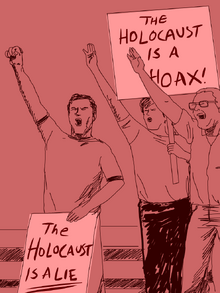
A small group of people has perpetuated a vicious lie known as Holocaust denial. They falsely claim there is no proof the Holocaust really happened.
In reality, the Holocaust is one of the most thoroughly documented events in history. The Nazis kept detailed records of all their activities, and there are hundreds of thousands of papers, photographs, films, and oral testimonies from the 1940s that describe the Nazis' systemic slaughter of Jews and other targeted groups. The Allied armies who liberated the Nazi concentration camps saw the evidence with their own eyes. They also took photos documenting the gas chambers, the starving prisoners, and the crematoria where corpses were burned. Moreover, population records prove that millions of European Jews disappeared between 1940 and 1945.
Denying the truth of the Holocaust against all evidence isn't just controversial, it's dangerous and wrong. In fact, in 12 European countries and in Israel, Holocaust denial is a crime. And Holocaust deniers have been punished elsewhere for libel, publishing lies or defamatory statements.
Nevertheless, several self-proclaimed "research institutes" and "scholars" have sprung up over the years to challenge the evidence of the Holocaust. They are usually motivated by anti-Semitism, or racism against Jews. Deniers sometimes advance absurd conspiracy theories about mysterious groups that secretly control world governments and financial institutions—one of the racist myths that Hitler spread about Jews.
Sometimes Holocaust deniers' hidden agenda is about power, and denial helps advance their interests. For example, in 2005, Mahmoud Ahmadinejad, then president of Iran, claimed the Holocaust was a "fairy tale." He even hosted an international conference for Holocaust deniers. Iran and Israel have long had hostile relations. Ahmadinejad hoped that casting doubt on the Holocaust would undermine the legitimacy of Israel, founded as a Jewish state three years after the end of the genocide. Needless to say, he was met with criticism from around the globe.
It's crucial to combat lies and conspiracy theories with truth and facts. This task is especially urgent now with regards to Holocaust denial, as there are fewer and fewer remaining survivors to share their personal stories.
Did You Know[]

Many non-Jews risked their lives to prevent Jews from falling into Nazi hands. Yad Vashem, the Holocaust memorial in Jerusalem, Israel, has officially recognized more than 20,000 of these helpers as "Righteous Among the Nations." Perhaps the most famous is Oskar Schindler, the German industrialist who saved almost 1,200 Jews by claiming them as essential workers in his factory. Director Steven Spielberg immortalized his story in the film Schindler's List. Here are a few other righteous gentiles:
Raoul Wallenberg was a Swedish diplomat who saved tens of thousands of Hungarian Jews. Working with the War Refugee Board, Wallenberg issued "certificates of protection" that granted Jews security from the Swedish government. He also built a number of safe houses in the Hungarian capital of Budapest. He declared the spaces Swedish territory, and housed up to 15,000 Jews within their walls.
Chiune Sugihara was the Japanese ambassador to Lithuania when Polish Jews were fleeing into Lithuania and desperate to head further east toward safety. Horrified by the refugees' plight, Sugihara repeatedly asked his superiors for permission to grant visas to the refugees; he was repeatedly denied. Against the orders of the Empire of Japan, which was allied with Nazi Germany, Sugihara personally issued transit visas to save as many as 6,000 Polish Jews.
Sir Nicholas Winton, a clerk at the London Stock Exchange, was alarmed by German expansion into Czechoslovakia, and the reports of violence against Jews in German-occupied territories. He heard about the Kindertransport, a rescue mission by Britain's Jewish agencies that ultimately saved 10,000 Jewish children from Germany and Austria. Winton set up a similar program in Czechoslovakia, saving nearly 700 Jewish children and placing them in British families.
Irena Sendler (pictured) was a Polish nurse. When the Germans occupied Poland, the Jews living in the capital were herded into a ghetto. Between 1942 and 1945, Sendler smuggled 2,500 Jewish children out of the Warsaw Ghetto, giving them false papers and finding families to adopt them.
Politics[]
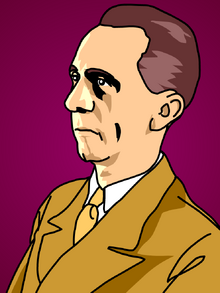
One of the keys to Hitler's rise to power was his skill with propaganda. That's the art of spreading highly biased information to promote a political cause or agenda. It's a powerful tool designed to arouse fear, patriotism, or other strong emotions.
Nazi propaganda used posters, books, and movies to demonize Jews as greedy, bloodthirsty monsters, or disgusting vermin, like rats or bugs. In contrast, it portrayed the rest of German society as cultural, scientific, and intellectual elites. All of Germany's misfortunes were blamed on the Jews, from the economic depression, to the nation's loss of power and prestige following World War I. Hitler himself was usually shown as a God-like figure.
Propaganda was so important to the Nazi regime that Hitler created a Ministry of Propaganda and Information. He appointed Josef Goebbels to run it. Goebbels (pictured) used censorship to control everything the German people read, saw, and heard. He ensured that Nazi policies were only ever discussed in positive terms. And he organized the sale of cheap radios, so that Hitler's speeches could be heard in every German home.
Hitler also chose artist Leni Riefenstahl as his official filmmaker. Her film The Triumph of the Will depicted a massive Nazi rally. It used striking cinematic images to promote that idea that Hitler's party would restore Germany to its former greatness. The propaganda film seared images of Nazi power, glory, and unity into the brains of its viewers. In spite of the hideous subject matter, Riefenstahl's technique and artistry are still admired by film critics. Echoes of the film's imagery can be found in movies as diverse as Star Wars, The Lord of the Rings, and The Lion King.
FYI Comic[]
There is none.
